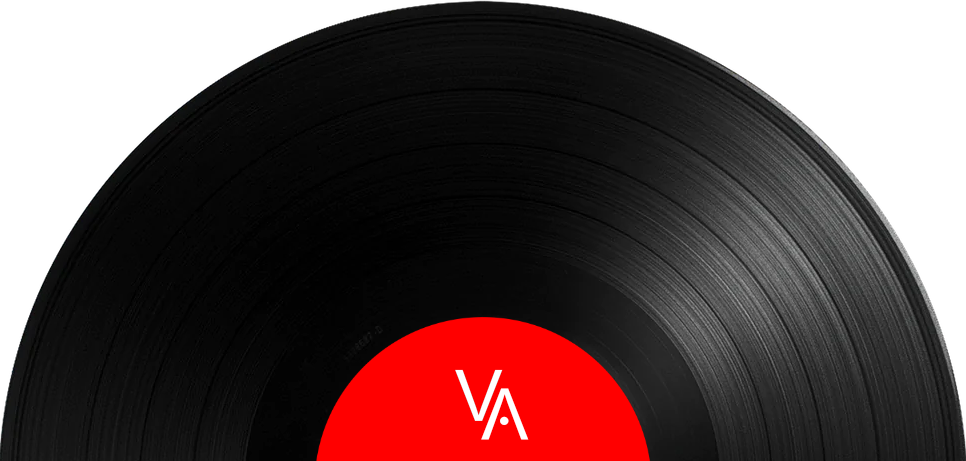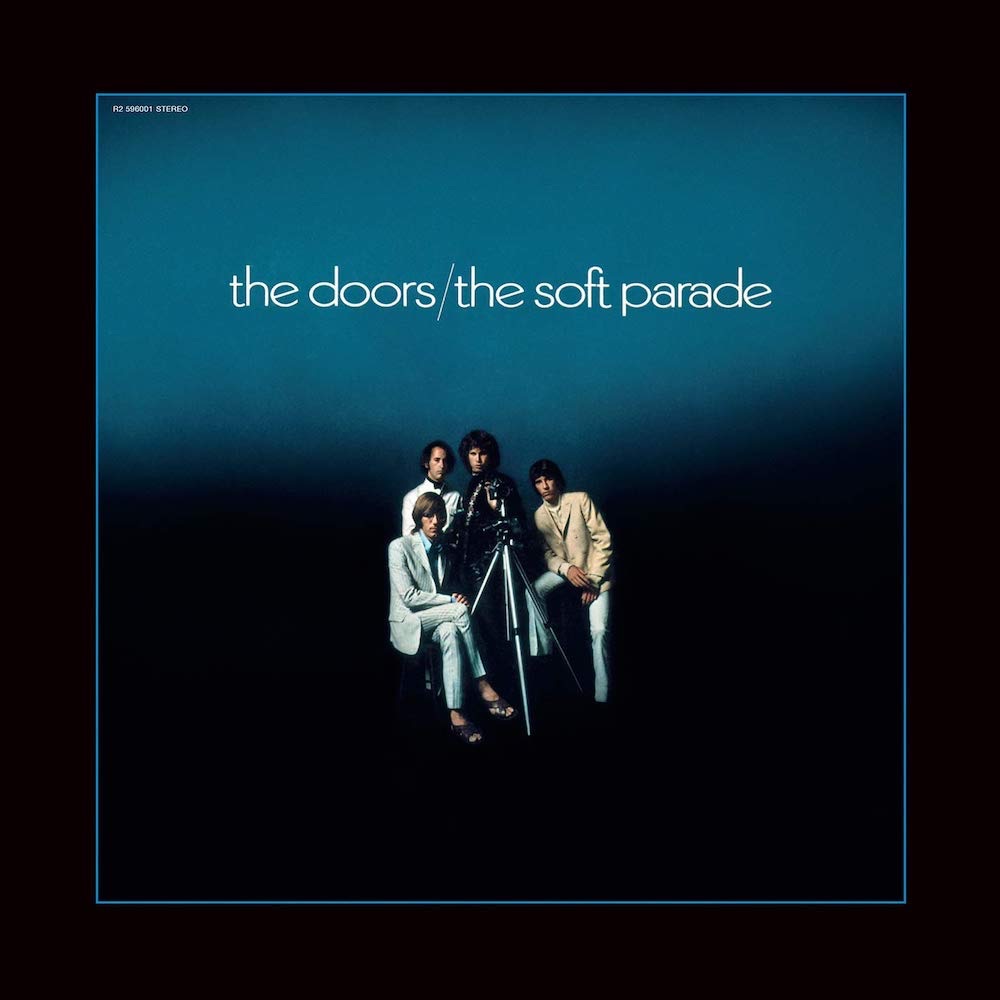
The Soft Parade is the fourth studio album by The Doors, released in July, 1969. Producer Paul Rothchild wanted to find a more accessible and radio friendly sound for the band and suggested incorporating brass and string arrangements. The album peaked at number six on the Billboard 200, and produced four singles: Touch Me, Wishful Sinful, Tell All the People and Runnin' Blue. It was initially panned by both critics and fans, who viewed it as a sellout in order to expand their audience and make more money. Over time, however - like many other great albums that seemed confusing a first - it has achieved a respectable critical standing. I think it's one of The Doors' best records.
The band's previous album, Waiting for the Sun, became the Doors' only number one LP on the Billboard 200 and spawned their second hit single, Hello, I Love You. It received considerable critical acclaim and there was significant pressure to make another number one album.
But singer Jim Morrison was tired of playing rock star. Throughout 1968 his behaviour had become increasingly erratic. "It was like pulling teeth to get Jim into it," sound engineer Bruce Botnick recalled, years later. He was unpredictable and unreliable, onstage and off, and his exploits and outbursts were causing problems. He is said to have considered quitting the band, but was persuaded by keyboardist Ray Manzarek to first finish recording The Soft Parade.
When the band entered Elektra Sound West Studio to begin work on The Soft Parade they didn't bring much in the way of demos with them, necessitating a considerable amount of valuable recording time be spent writing songs. Rothchild later said it was the hardest he'd ever worked as a producer, but he was also addicted to cocaine and this, when coupled with his strict authoritarian leadership style and the unpreparedness of the band, caused considerable friction. In the end, the album was by far the most expensive record the group recorded, costing some $80,000 to complete. Comparatively, their first record had only cost $10,000.
Drummer John Densmore and Manzarek were receptive to Rothchild's idea of injecting horns and strings into the arrangements, so the producer hired Paul Harris to compose the arrangements that were later overlaid onto the songs the band recorded.
Then Morrison suddenly insisted that band members receive individual song writing credits, something they'd never bothered with before. He didn't like guitarist Robbie Krieger's lyric for the song Tell All The People and at first refused to sing the line, "Can't you see me growing, get your guns." As a result, The Soft Parade was the first Doors record to list band members' contributions separately rather than collectively. This was, no doubt, a good thing for Krieger's bank account, considering that mostly due to Morrison's growing lack of interest he ended up writing half of The Soft Parade's tracks.
Krieger had previously penned Light My Fire, the musical home run that launched the band into the stratosphere of superstardom just a couple of years earlier. He continued to hone his writing skills during The Soft Parade sessions, and another one of his songs, Touch Me - working titles Hit Me and I'm Gonna Love You - was selected to be the album's lead single and became another one of The Doors' biggest hits. Saxophone player Curtis Amy was brought in to perform the solo on the song, which was supposedly influenced by the works of John Coltrane.
Morrison's Shaman's Blues and The Soft Parade were in direct contrast to what Krieger was writing, and caused music critic Doug Sundling to opine that the album contained a mixture of acid rock and sunshine pop influences. Not quite the impression the band wanted to make.
The cover photograph was taken by Joel Brodsky, who had also been responsible for both the cover of the Doors' debut album and their second album, Strange Days. An almost formal portrait of the band set on a deep blue background. I've always really liked it.
The underground press was less than complimentary when the album was released. David Walkey, writing in New York's East Village Other, stated he thought the album was "badly messed up by the syrupy arrangement of Paul Rothchild and should be renamed, The Rothchild Strings Play the Doors."
Ouch.
Richie Unterberger, in a review for AllMusic, was a bit more positive. "About half the record is quite good, especially the huge hit Touch Me (their most successful integration of orchestration)". But he also felt it was the "weakest studio album recorded with Jim Morrison", as well as "their weakest set of material."
There were a lot of other negative reviews as well, but the long view of time has pretty much vindicated the record and proven it to be a minor masterpiece. The version I have is The 50th Anniversary Deluxe Edition, which consists of three CDs and a remastered LP of the original album pressed on 180-gram vinyl. The highlight is probably the tracks with the horns and strings stripped away, which is how some people feel they should have been released initially. I really like the stripped down versions, but I also like the original record.
Overall, it's just a really good record. This particular reissue is …
The Soft Parade is the fourth studio album by The Doors, released in July, 1969. Producer Paul Rothchild wanted to find a more accessible and radio friendly sound for the band and suggested incorporating brass and string arrangements. The album peaked at number six on the Billboard 200, and produced four singles: Touch Me, Wishful Sinful, Tell All the People and Runnin' Blue. It was initially panned by both critics and fans, who viewed it as a sellout in order to expand their audience and make more money. Over time, however - like many other great albums that seemed confusing a first - it has achieved a respectable critical standing. I think it's one of The Doors' best records.
The band's previous album, Waiting for the Sun, became the Doors' only number one LP on the Billboard 200 and spawned their second hit single, Hello, I Love You. It received considerable critical acclaim and there was significant pressure to make another number one album.
But singer Jim Morrison was tired of playing rock star. Throughout 1968 his behaviour had become increasingly erratic. "It was like pulling teeth to get Jim into it," sound engineer Bruce Botnick recalled, years later. He was unpredictable and unreliable, onstage and off, and his exploits and outbursts were causing problems. He is said to have considered quitting the band, but was persuaded by keyboardist Ray Manzarek to first finish recording The Soft Parade.
When the band entered Elektra Sound West Studio to begin work on The Soft Parade they didn't bring much in the way of demos with them, necessitating a considerable amount of valuable recording time be spent writing songs. Rothchild later said it was the hardest he'd ever worked as a producer, but he was also addicted to cocaine and this, when coupled with his strict authoritarian leadership style and the unpreparedness of the band, caused considerable friction. In the end, the album was by far the most expensive record the group recorded, costing some $80,000 to complete. Comparatively, their first record had only cost $10,000.
Drummer John Densmore and Manzarek were receptive to Rothchild's idea of injecting horns and strings into the arrangements, so the producer hired Paul Harris to compose the arrangements that were later overlaid onto the songs the band recorded.
Then Morrison suddenly insisted that band members receive individual song writing credits, something they'd never bothered with before. He didn't like guitarist Robbie Krieger's lyric for the song Tell All The People and at first refused to sing the line, "Can't you see me growing, get your guns." As a result, The Soft Parade was the first Doors record to list band members' contributions separately rather than collectively. This was, no doubt, a good thing for Krieger's bank account, considering that mostly due to Morrison's growing lack of interest he ended up writing half of The Soft Parade's tracks.
Krieger had previously penned Light My Fire, the musical home run that launched the band into the stratosphere of superstardom just a couple of years earlier. He continued to hone his writing skills during The Soft Parade sessions, and another one of his songs, Touch Me - working titles Hit Me and I'm Gonna Love You - was selected to be the album's lead single and became another one of The Doors' biggest hits. Saxophone player Curtis Amy was brought in to perform the solo on the song, which was supposedly influenced by the works of John Coltrane.
Morrison's Shaman's Blues and The Soft Parade were in direct contrast to what Krieger was writing, and caused music critic Doug Sundling to opine that the album contained a mixture of acid rock and sunshine pop influences. Not quite the impression the band wanted to make.
The cover photograph was taken by Joel Brodsky, who had also been responsible for both the cover of the Doors' debut album and their second album, Strange Days. An almost formal portrait of the band set on a deep blue background. I've always really liked it.
The underground press was less than complimentary when the album was released. David Walkey, writing in New York's East Village Other, stated he thought the album was "badly messed up by the syrupy arrangement of Paul Rothchild and should be renamed, The Rothchild Strings Play the Doors."
Ouch.
Richie Unterberger, in a review for AllMusic, was a bit more positive. "About half the record is quite good, especially the huge hit Touch Me (their most successful integration of orchestration)". But he also felt it was the "weakest studio album recorded with Jim Morrison", as well as "their weakest set of material."
There were a lot of other negative reviews as well, but the long view of time has pretty much vindicated the record and proven it to be a minor masterpiece. The version I have is The 50th Anniversary Deluxe Edition, which consists of three CDs and a remastered LP of the original album pressed on 180-gram vinyl. The highlight is probably the tracks with the horns and strings stripped away, which is how some people feel they should have been released initially. I really like the stripped down versions, but I also like the original record.
Overall, it's just a really good record. This particular reissue is …



